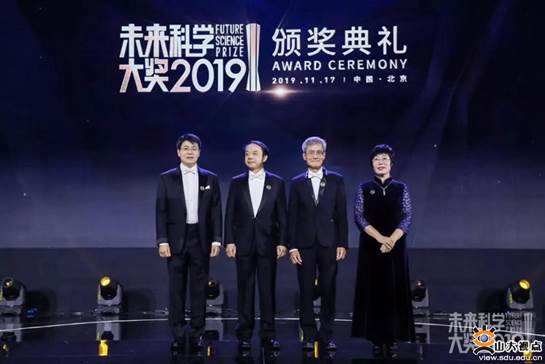Professor Wang Xiaoyun won the 2019 future science prize
Wang Xiaoyun, dean of school of cyberspace security, shandong university, was awarded the "mathematics and computer science prize" at the 2019 future science prize ceremony in Beijing on November 17. Guo xinli, party secretary of shandong university, was invited to attend the award ceremony.

Wang Xiaoyun, born in Zhucheng, Shandong province, is a cryptographer and academician of Chinese academy of sciences. In 1983, Wang Xiaoyun was admitted to the mathematics department of Shandong university and obtained bachelor's degree, master's degree and doctor's degree. In 1993, she worked as a lecturer, associate professor and professor in the mathematics department of Shandong university. In 2017, she was elected as an academician of the Chinese academy of sciences and won the special award of cryptography innovation award of the China cryptography society. Wang Xiaoyun has been engaged in the study of cryptography theory and related mathematical problems for many years. The mathematics and computer science award was awarded for her pioneering work in cryptography, where her innovative approach to cryptanalysis revealed weaknesses in the widely used cryptographic hash function and led to a new generation of cryptographic hash function standards.
Academician Wang Xiaoyun also set three "unique" records for the future science prize: the only female scientist among the future science award winners, the only scientist with a PhD from a Chinese university, and the only scientist with a bachelor's degree, master's degree and PhD from the same university. In her acceptance speech, she thanked her mentors, family members, students and especially Tsinghua university and Shandong university, both of which she had been very happy working at. She also believed that we were fortunate enough to live in the best of times in this country. We cannot stop there. We must build on what we have achieved in the past. Cryptography could provide the most basic support for network security. It not only solves the problem of network security, but also provides us with a lot of convenience, assistance for the network community, and of course contributes to the development of digital economy. She hoped that through her work, more people would be interested in the field of cryptography, and more research projects would be devoted to cryptography in the future, so that the whole society and all people would live safer and happier lives.
The future science prize, known as the "China Nobel Prize", is China's first world-class science award awarded by a non-governmental organization. Created in 2016, the award includes three categories: life sciences, material sciences, and mathematics and computer sciences. The future science prize honors scientists who have made significant scientific achievements for the whole of humanity, and has gradually become one of the most influential science awards in China. In addition to the mathematics and computer science prize awarded by academician Wang Xiaoyun, the 2019 future science prize was also awarded to Shao Feng of the institute of life sciences in Beijing, Wang Yifang of the institute of high energy physics of the Chinese academy of sciences and professor Lu Jinbiao of the university of California, Berkeley, USA.
From 2016 to 2019, a total of 16 experts and scholars have won future science prize, among which three alumni of Shandong university have won. And the total number of undergraduate students has ranked first in China. In 2016, academician Xue Qikun who got a bachelor’s degree from Shandong university won the material science award of the future science prize. In 2018, professor Ma Dawei who got a bachelor’s degree from Shandong university won the material science award of the future science prize. In 2019, academician Wang Xiaoyun, who studied at Shandong university for her bachelor's degree, master's degree and doctor's degree, won the mathematics and computer science award of the future science prize.
[Contributors: Alumni office of publicity department; Authors: Xuan Wen; Photos: Information editor: News studio; Responsible editor: Liu Tingting]
(Editor in Charge: Lei Hao)